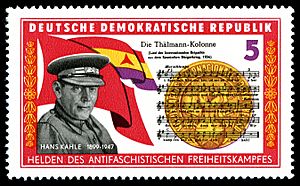Hans Kahle facts for kids
Quick facts for kids
Hans Kahle
|
|
|---|---|

Hans Kahle stamp
|
|
| Born | 22 April 1899 Berlin, German Empire |
| Died | 1 September 1947 (aged 48) Ludwigslust, Allied-occupied Germany |
| Allegiance | |
| Service/ |
|
| Rank | Lieutenant colonel |
| Battles/wars | First World War Spanish Civil War
|
Hans Kahle (born April 22, 1899 – died September 1, 1947) was a German journalist and a supporter of communism. He played an important role in the Spanish Civil War and later became a police chief in Mecklenburg, a region in Germany.
Contents
Early Life and Education
Hans Kahle was born in Berlin, Germany. His father was a high-ranking official. Hans went to high school and then to a main military academy in Lichterfelde. He joined the Imperial German Army and fought as a young officer in World War I. In 1918, he became a prisoner of war in France. He was able to return home to Germany in 1920.
After the war, he started learning about business. He also studied at the London School of Economics in England. From 1921 to 1926, he worked as a clerk in Mexico. In 1927, he came back to Germany.
Joining the Communist Party
In 1928, Hans Kahle joined the German Communist Party (KPD). This party believed in a society where everyone is equal and resources are shared by all. From 1930 to 1933, he worked as an editor and publishing director. He also led a group connected to the Communist Party.
Life in Exile
In 1933, Hans Kahle had to leave Germany because of political reasons. He first went to Switzerland and then to France. In France, he worked as a journalist. He also helped organize aid for victims of a miners' uprising in Spain.
In 1936, he helped organize the International Brigades in Paris. These brigades were groups of volunteers from many different countries who went to Spain to fight. Soon after, Hans Kahle himself went to Spain.
Fighting in the Spanish Civil War
Hans Kahle fought in the Spanish Civil War until 1938. He was part of the International Brigades, which supported the Spanish Republic. He started as a commander of a group called the "Edgar André Battalion." Later, he commanded the XI International Brigade.
In 1937, he became the commander of the 17th Division. During the Battle of the Ebro in 1938, he led the 45th Division of the Spanish Republican Army.
Internment and Return to Germany
After fighting in Spain, Hans Kahle was held in camps in France between 1938 and 1939. From 1940 to 1941, he was also held in the United Kingdom and Canada.
After being released in 1941, Kahle returned to London. There, he worked as a journalist reporting on the war. He also helped start the Free Germany Movement. This group was believed by British intelligence to be involved in gathering information for the Soviet Union. British intelligence kept a close watch on Hans Kahle because they thought he was a very important person working for Soviet intelligence.
In February 1946, Hans Kahle returned to the part of Germany that was controlled by the Soviet Union after World War II. He helped build up this area, which later became East Germany. Kahle became the chief of the Volkspolizei (people's police) in Mecklenburg. He also became the state chairman of the ruling Socialist Unity Party of Germany (SED) in Mecklenburg.
Hans Kahle had a serious stomach operation on August 22, 1947, but he did not recover. He died in Ludwigslust in 1947 at the age of 48.
 | Percy Lavon Julian |
 | Katherine Johnson |
 | George Washington Carver |
 | Annie Easley |

